mHealth apps could improve stress management—but apps lack value
In total, researchers analyzed a sample of 433 different mobile apps for stress management. The apps were scored and categorized based on their impact, presence, number of results, language and operating system. Of the apps, 21.7 percent were in the “relaxing music” category, 10.9 percent in the “draw and paint” category, 1.2 percent in the “heart rate control” category and 1.2 percent in “integral methodology.” Despite the wide range of apps available, only 2 percent were identified as high or medium interest.
“There is no research that shows the real influence of these apps for the reduction and management of stress, but it is worth mentioning the revolution regarding easy access and learning of techniques and methodologies for stress management,” concluded Blazquez and colleagues. “There are many low-value apps available at the moment, but the analysis shows that they are adding new functionalities and becoming fully integrated self-management systems with extra capabilities such as professional assistance services and online support communities.”
Mobile health applications can help manage stress, but most apps lack value, according to a study published May 9 in JMIR mHealth and uHealth.
mHealth apps have grown in popularity for a variety of health-related concerns due to their ease of use and accessibility. In this study, researchers examined relevant mHealth apps on both the iOS and Android online stores to identify the type and value of stress management apps.
“Personal health technologies look promising in order to support people in health and welfare self-management,” wrote first author David Blazquez Martin, PhD, and colleagues. “New tools to facilitate welfare self-management should be accessible wherever and whenever they are needed.”

